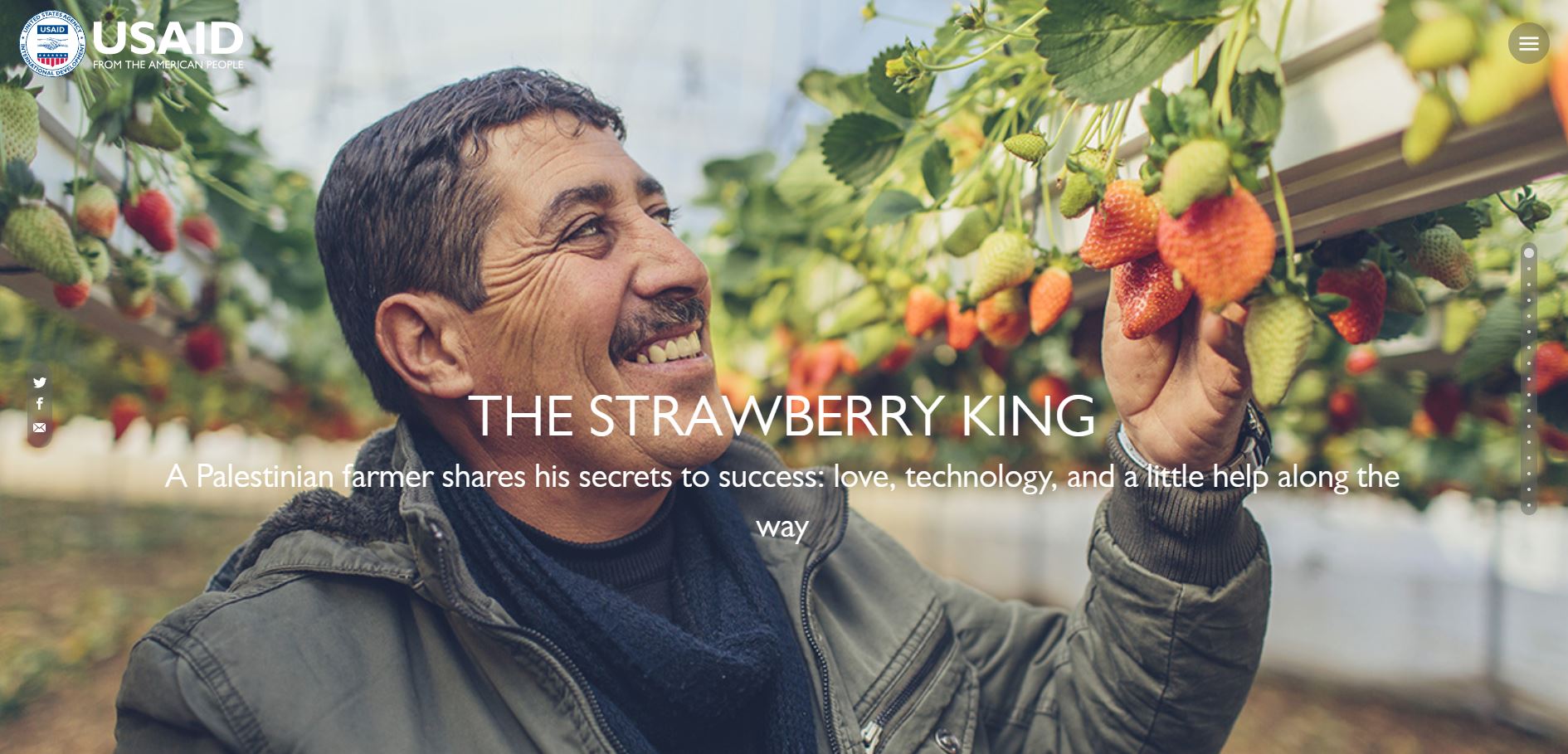EXCLUSIVE: Palestinian face of Trump's 'deal' denounces US 'propaganda'
West Bank strawberry farmer whose images were used on White House website says 'deal of the century' is 'a project to liquidate the Palestinian cause'

A USAID image of Abu al-Rub and his daughter, taken from the White House website promoting the "Peace to Prosperity" plan (whitehouse.gov)
Published date: 26 June 2019 10:15 UTC |
A Palestinian strawberry farmer whose photo was used in a White House brochure promoting Donald Trump’s "deal of the century" has told Middle East Eye he is “insulted and angry” and has been used to promote a “dangerous political project”.
Several images of Osama Abu al-Rub, from Qabatiya, south of Jenin in the occupied West Bank, and members of his family were used on a website which was launched ahead of this week’s US-organised “Peace to Prosperity” economic workshop in Bahrain.
But Abu al-Rub, 52, told Middle East Eye that he was offended by the use of the photos and denounced the "deal of the century" as “a project aimed at liquidating the Palestinian cause”.

The photos originally appeared in a story on the U.S. Agency for International Development (USAID) website profiling the US government organisation’s support for Abu al-Rub’s strawberry business, but the 52-year-old said he no longer received American funding, and no one had asked his permission to re-use the images on the White House website.
“I am very upset by the publication of my family photos and the US manipulation in promoting the deal of the century," he said.
"We are ashamed of this project aimed at liquidating the Palestinian cause. It is impossible to accept it or to be one of its tools."
I believe that no one is authorised to give up one grain of dust from Palestine.- Osama Abu al-Rub
Abu al-Rub told MEE that he was similar to any Palestinian in rejecting Trump’s "deal" which he said offered no prospect of Palestinian liberation from Israeli occupation.
"I do not understand politics and I cannot talk about it. Nevertheless, I believe that no one is authorised to give up one grain of dust from Palestine. I refuse to bargain on the land of Palestine."
Abu al-Rub compared the "deal of the century" to the Sykes-Picot Agreement, the secret Anglo-French treaty which carved the Middle East into spheres of influence in 1916, and led to the British occupation of Palestine.
"From the Sykes–Picot Agreement to this day, we as Palestinians have been subject to similar political policies,” he said. “But our steadfastness on our land and our continued existence will fail all the conspiracies woven against us and against our cause.”
'The Strawberry King'
The original USAID story about Abu al-Rub called him “The Strawberry King” and said he had received funding from the organisation in 2013.
“Osama started growing strawberries six years ago, in the traditional way,” the website said.

“He planted his strawberries in the ground, where they were susceptible to the whims of nature, to poor soil conditions, to pests, and to imprecise irrigation.
“His yields were not that good. His strawberries were not that delectable."
As a result of USAID support, Abu al-Rub had built greenhouses, and started hanging his strawberry plants above the ground and using “computerised irrigation”, it said.
“Thanks to his new knowledge and technologies, Osama’s strawberries are flourishing. His farm is a model for the next generation of Palestinian farmers and agronomists,” it said.
Successful business
But Abu al-Rub said his farm had been a successful business before receiving a limited grant from USAID.
He originally started planting strawberries over one acre of land in 2008. The following year, he planted and harvested two acres of land, and gradually expanded the farm to 18-20 acres.
USAID staff had visited him in 2013 to inform him about a new aid project being implemented to boost strawberry growing in the West Bank.
They wanted to benefit from his experience and discuss with him ways to develop strawberry cultivation, and the mechanisms required for that. They also delivered a presentation on how technology could be used to improve conditions for strawberry growth throughout the year.
"At that time I had come a long way in cultivating the strawberries in ways that were not previously attained in Palestine," he said.
"I've put a lot of effort into this, and from its foundation it was a successful and progressive project, even before I got funding from the USAID agency,” he said.
"[USAID] is using this small and simple project to promote a dangerous political project. I feel very insulted and angry about it, and I fully reject this manipulation.
“I was one of the thousands Palestinians who received funding with the approval of the institutions of the Palestinian Authority. Today, at a political level, the USAID agency must be interrogated for using us as propaganda for the 'deal of the century'.
"We are under occupation, and it is the responsibility of the whole world to support us and stand with us. But if they think that funding some economic projects is the solution to our cause, they are wrong, and we will never accept that.”
Abu al-Rub said he had consulted with the Palestinian Ministry of Agriculture before accepting American funding. USAID supported him by providing technology equipment worth 150,000 shekels ($41,700), but he had also invested 250,000 shekels ($70,000) of his own money at the time, he added.
USAID support for the farm lasted for one year, he said. The project had not required him to agree to any of the conditions sometimes imposed on Palestinian recipients of aid, such as renouncing Palestinian factions considered to be terrorist organistions, or prohibiting participation in political action.
USAID, the US government’s international development agency, said in February that it had ceased all funding for projects in the West Bank and Gaza, part of a wider withdrawal of US financial support for the Palestinians.
https://www.middleeasteye.net/news/exclusive-palestinian-face-trumps-deal-denounces-us-propaganda



0 Comments:
Post a Comment
Subscribe to Post Comments [Atom]
<< Home